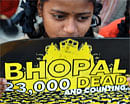

Groundwater in areas around the Bhopal gas tragedy site contain almost 40 times more pesticides than allowed under the Indian standards, the Centre for Science and Environment has claimed.
The Pollution Monitoring Lab of the NGO tested water and soil samples from in and around the Union Carbide factory, and found high concentrations of pesticides and heavy metals.
All 11 groundwater samples collected from colonies around the UCIL factory were found to be contaminated with chlorinated benzene compounds and organochlorine pesticides, the test results showed.
"The reason this is extremely worrying is because we have found the toxins in the groundwater we have checked from almost 3 km below the factory," said Chandra Bhushan, associate director, in-charge of the CSE laboratory.
The Bhopal gas tragedy occurred on December 3, 1984 when the plant accidentally released Methyl Isocyanate (MIC) gas, killing around 5000 people and permanently incapacitating many others.
All the samples collected from within the factory were found to be highly contaminated. The waste stored within the premises had Carbaryl content of 9,856 parts per million (ppm) and mercury content of 1,065 ppm, Bhushan said.
The concentration of pesticides was 1.1 to 38.6 times higher than the Indian standard, the study claimed.
"The profile of chemicals found within the UCIL factory and in the waste disposal site of UCIL matches the chemicals found in the groundwater sample in the colonies outside. There is no other source of these chlorinated benzene compounds and pesticides than UCIL," Bhushan said.
CSE Director Sunita Narain said, "The factory site in Bhopal is leading to chronic toxicity –- continuous tiny exposure leading to poisoning of our bodies. This is different from acute poisoning and so the claim that the factory is not dangerous because people can touch the waste is misleading."